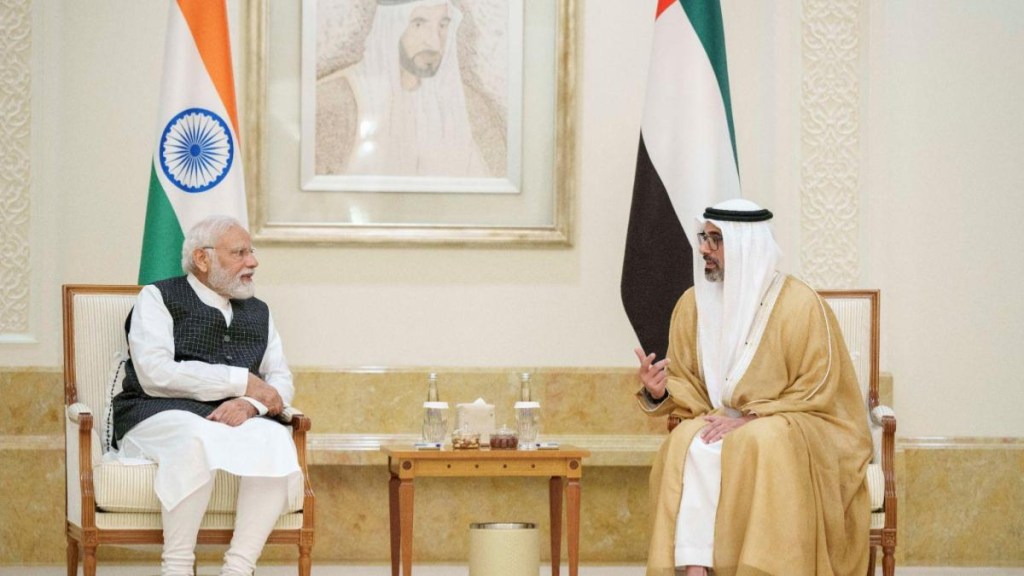By Dr Sreshtha Chakraborty
The strategic partnership agreement between India and the United Arab Emirates stands out as the most aligned and mutually respectful. India and the UAE share a robust and thriving cultural bond. Founded on interpersonal interactions and reciprocal confidence, it is a partnership in which frequent interactions reinforce a convergence of strategic interests and confidence and credibility triumph over diplomatic reciprocity and etiquette, laying the groundwork for one of India’s most significant and active bilateral relationships. The India-UAE collaboration should be seen in the context of a transformation occurring in the region, as many Gulf States are seeking a future that goes beyond reliance on fossil fuels. A significant portion of this is being showcased during Modi’s current tour to the UAE, marking his third tour in just under eight months. Nevertheless, it is crucial to contemplate the time and the communication strategy employed for the inauguration of this Hindu temple in Abu Dhabi built by the Bochasanwasi Akshar Purushottam Swaminarayan Sanstha or the BAPS society. The construction of this temple in the UAE not only provides an additional place of worship for the Hindu community but also serves as a means for both India and the UAE to showcase the influence and attractiveness of their cultural diplomacy.
Culture, economy, manpower services, civil aviation, the management of criminal activities, the development of human connectivity, and communication through the exchange of news and information via print and electronic media are among the many areas of mutual interest in which India and the UAE are actively involved. To this end, they have signed a vast array of Memorandums of Understanding and agreements.
Through the cultural framework of 1975, cultural diplomacy was established between the two nations. Official and interpersonal cultural exchange between the two nations persisted by this framework. After a 34-year break, the story was rekindled in 2015 when Prime Minister Narendra Modi made history by visiting the United Arab Emirates, ushering in a new era of diplomatic relations. A symphony of visits, agreements, and plaudits followed, strengthening the ties between the two countries.
The Ahlan Modi (Welcome Modi) celebration in Abu Dhabi on Tuesday was an exceptionally magnificent affair. The meticulously arranged event and the subsequent temple inauguration served as a testament to the strengthening bond between India and the UAE. Both countries see a convergence of interests in their partnership. The strong personal affinity and intimate relationship between President Sheikh Mohamed bin Zayed Al Nahyan and PM Modi plays a crucial role in the swift advancement of this robust alliance. Both leaders hold a shared viewpoint on important matters that have a significant impact on the region and recognize the crucial role that their respective countries can play in promoting development and prosperity in the region. UAE President Sheikh Mohammed bin Zayed Al Nahyan attended the Republic Day celebrations in 2017, and the friendship between the two countries reached its highest point when PM Modi received the esteemed Order of Zayed in 2019. Given the Indian diaspora population of 3.5 million, the United Arab Emirates (UAE) has played a significant role in providing employment opportunities and facilitating the transfer of money back to India through remittances. That has been a crucial perspective from which New Delhi has observed Abu Dhabi. In recent years, a significant change has occurred where the connection has been detached from domestic politics and now mirrors the fluctuations in global politics, as well as the changes happening in West Asia.
PM Narendra Modi unveiled Abu Dhabi’s inaugural Hindu temple during his two-day visit to the UAE. The timing of his travel, just months before the general elections in India, indicates the strong relationship between the two nations. The shrine serves as a conduit for cultural exchange between both nations. The Prime Minister’s attendance also served as a reminder that during his initial visit in August 2015, he had made a formal request to the country’s leadership for the allocation of land to construct a temple that would symbolize the growing influence of India’s soft power. India has actively been disseminating various facets of its culture and way of life globally. Notable among these are yoga, music, and gastronomy. Indian philosophy, widely admired and practised in many nations in the world, would further get a boost through this Hindu Mandir in Abu Dhabi. cater to the religious and spiritual requirements of the UAE’s substantial Hindu community.
Modi’s visit is occurring during a crucial period in West Asia. With the ongoing fighting in Gaza, an increasing number of both governmental and non-governmental entities are becoming involved, complicating efforts to bring the war to a close and address the unparalleled humanitarian emergency. India and the UAE have always advocated for the cessation of hostilities and a prompt ceasefire, urging both sides and the international community to seek a peaceful resolution.
The Minister of Education and Skill Development & Entrepreneurship, Dharmendra Pradhan, and the Minister of Education of the United Arab Emirates, Dr Ahmad Al Falasi, signed a Memorandum of entered onto a Memorandum of Understanding (MoU) to enhance and reinforce the current educational collaboration, thereby promoting the mobility of students and teachers, as well as implementing other projects. The Memorandum of Understanding (MoU) seeks to enhance the current collaboration between educational institutions in both countries. The Memorandum of Understanding (MoU) inked during the meeting signifies a crucial milestone in enhancing educational collaboration between India and the United Arab Emirates (UAE). Intending to promote a collaborative attitude and enable the sharing of resources, expertise, and experiences to improve educational standards and opportunities for their respective citizens, India and the UAE have taken a major step forward with this initiative.
The author holds a PhD in International Studies from Jawaharlal Nehru University and is currently working as an Assistant Professor at Amity Law School, Noida .
Disclaimer: Views expressed are personal and do not reflect the official position or policy of Financial Express Online. Reproducing this content without permission is prohibited.
